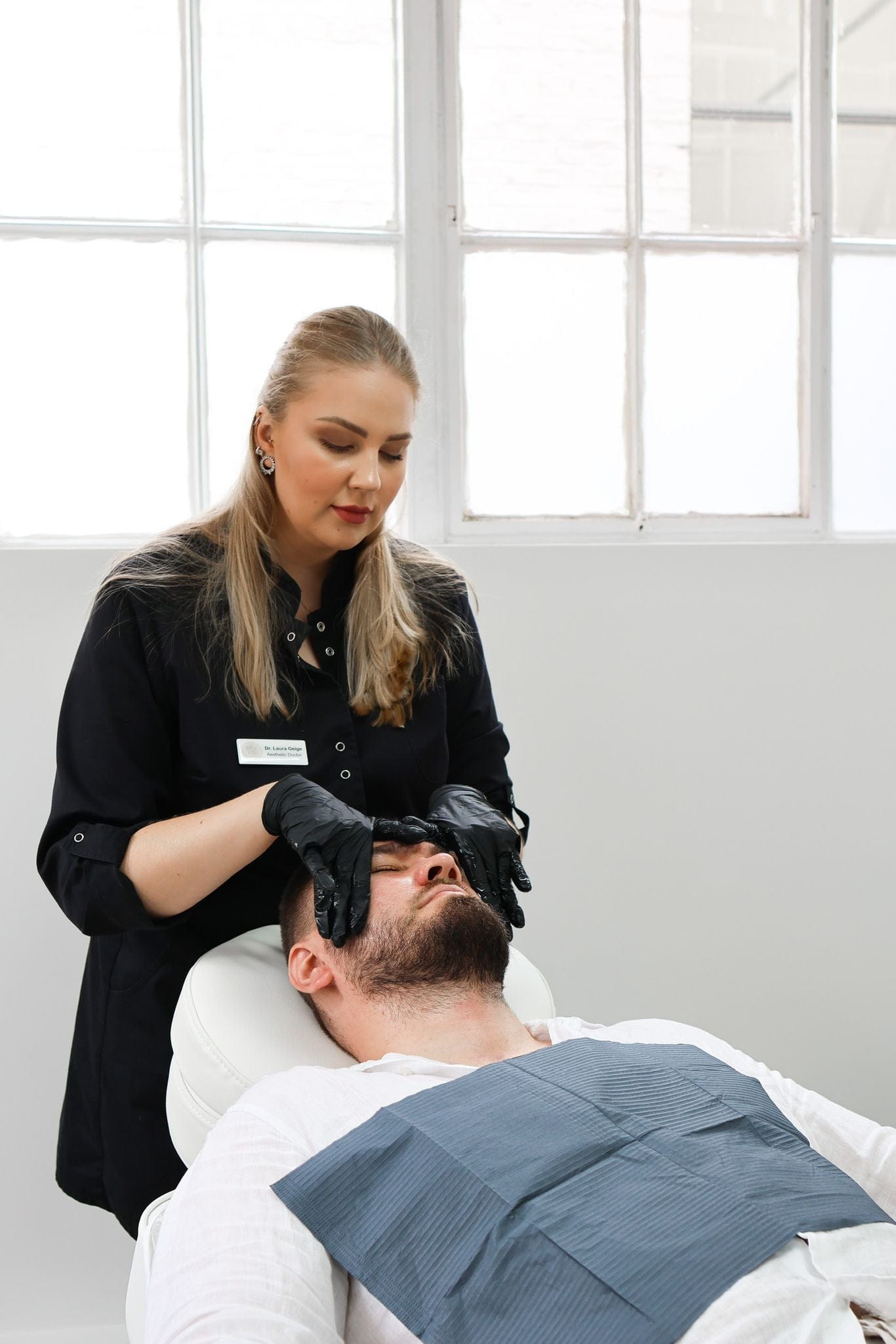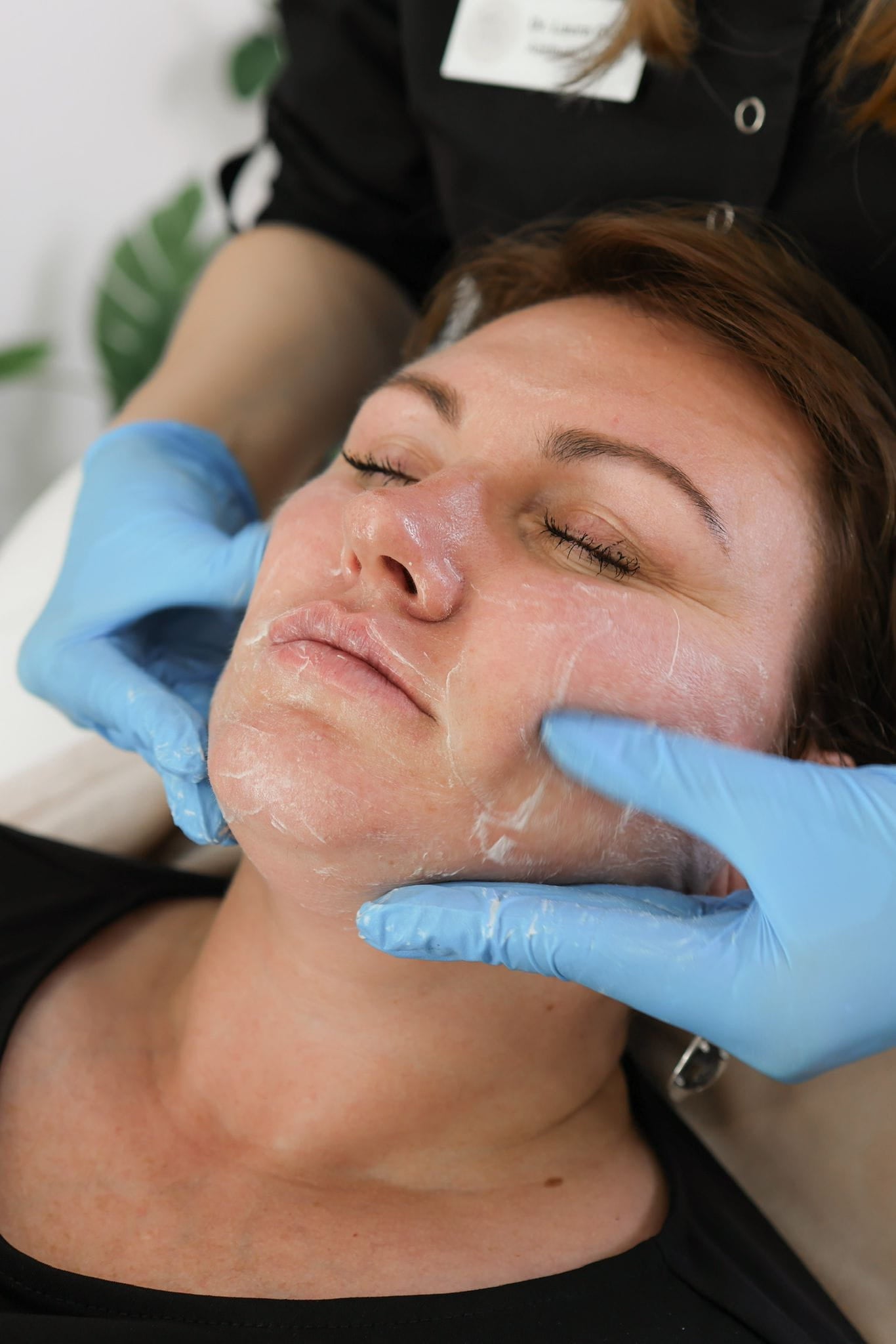Cosmelan Depigmentation Peel
Melasma, a common skin condition characterized by brown or gray-brown patches on the face, can be particularly frustrating to manage. Those seeking effective solutions often turn to advanced treatments like the Cosmelan Depigmentation Peel. This intensive treatment utilizes a combination of ingredients to target melanin production and lighten hyperpigmentation.
Mechanism of Action
The Cosmelan Depigmentation Peel works by inhibiting melanin production in the skin. Its active ingredients, including kojic acid, hydroquinone, and azelaic acid, penetrate deep into the epidermis and act on multiple stages of melanogenesis.
Kojic acid inhibits tyrosinase, a key enzyme involved in melanin synthesis. Hydroquinone blocks melanin formation at an earlier stage, while azelaic acid reduces inflammation and oxidative stress that can contribute to pigmentation issues.
Efficacy in Treating Melasma
Cosmelan Depigmentation Peel has gained popularity as a treatment for melasma in the UK due to its potential for significant improvement in pigmentation. Numerous studies and anecdotal evidence suggest that it is effective in reducing the appearance of brown or gray-brown patches on the face.
The peel’s effectiveness stems from its multi-faceted approach to addressing melasma. By inhibiting melanin production, reducing inflammation, and targeting oxidative stress, Cosmelan aims to lighten hyperpigmentation and even out skin tone.
While results can vary depending on individual skin type and severity of melasma, many patients report noticeable improvement after a course of treatments. It is important to note that Cosmelan requires careful application by a qualified dermatologist or esthetician to ensure optimal results and minimize the risk of side effects.
Clinical Studies and Evidence
While Cosmelan Depigmentation Peel has gained popularity for melasma treatment in the UK, robust clinical evidence supporting its efficacy is limited. Many studies available are observational or retrospective, making it difficult to establish a clear cause-and-effect relationship between the peel and pigmentation improvement.
Some small-scale clinical trials have shown promising results, demonstrating reductions in melanin intensity and improved skin tone after multiple Cosmelan treatments. However, these studies often involve limited participant numbers and may not be representative of the general population.
Larger, randomized controlled trials are necessary to definitively assess the long-term effectiveness and safety of Cosmelan for melasma treatment. These trials should compare Cosmelan to other established therapies and control groups to provide more reliable evidence on its efficacy and potential drawbacks.
Positive Results
Cosmelan Depigmentation Peel has garnered considerable attention as a potential solution for melasma in the UK. Many individuals who have undergone the treatment report noticeable reductions in pigmentation, with some experiencing significant improvements in their skin tone. These positive experiences, along with anecdotal evidence from practitioners, contribute to Cosmelan’s growing popularity.
The peel’s multi-pronged approach to targeting melanin production and inflammation appears to be effective for many individuals. By combining ingredients like kojic acid, hydroquinone, and azelaic acid, Cosmelan aims to lighten hyperpigmentation and achieve a more even skin tone.
Limitations and Potential Side Effects
It is important to understand that the results of the Cosmelan Depigmentation Peel can vary considerably from person to person. Factors like skin type, severity of melasma, adherence to post-treatment instructions, and individual skin physiology all play a role in determining the final outcome.
While Cosmelan may be effective for some individuals, it is not a guaranteed solution for everyone. Some people may experience only minimal improvement or no noticeable change in their pigmentation after undergoing treatment.
Moreover, Cosmelan Depigmentation Peel carries potential side effects that should be carefully considered. These can include skin irritation, redness, peeling, dryness, and temporary hyperpigmentation. In some cases, more serious side effects like allergic reactions or post-inflammatory hypopigmentation (lightening) may occur.

It is crucial to consult with a qualified dermatologist or esthetician before undergoing any chemical peel treatment, including Cosmelan. They can assess your individual skin type and condition, discuss the potential risks and benefits, and determine if Cosmelan is an appropriate treatment option for you.
Availability and Cost in the UK
The availability of cosmetic treatments like the Cosmelan Depigmentation Peel in the UK varies depending on location and practitioner. Costs for a course of Cosmelan can also differ significantly between clinics and may depend on factors such as the severity of melasma, the number of sessions required, and the clinic’s geographical location.
Regulatory Approval and Licensing
The cost of Cosmelan Depigmentation Peel in the UK can vary considerably depending on a number of factors including the severity of melasma, the number of treatments required, and the specific clinic. It is advisable to consult with a qualified practitioner for an accurate quote.
Regulatory approval and licensing for cosmetic treatments like Cosmelan are overseen by the Medicines and Healthcare products Regulatory Agency (MHRA) in the UK. Practitioners who administer chemical peels must hold appropriate qualifications and licenses, ensuring they are competent and adhere to safety guidelines.
Price Range and Factors Affecting Cost
Cosmelan Depigmentation Peel is available throughout the UK but pricing can vary widely depending on several factors. A typical course of treatment might range from £500 to £1500 or more, with prices increasing for those requiring a greater number of sessions.
The cost will be influenced by the clinic’s location (e.g., larger cities tend to have higher costs), the practitioner’s experience and qualifications, and the severity of the melasma being treated.
Alternative Treatments for Melasma in the UK
Melasma, a common skin condition characterized by brown or gray-brown patches on the face, can be a source of concern for individuals seeking effective treatment options. The UK has seen increasing interest in advanced dermatological treatments, with the Cosmelan Depigmentation Peel emerging as a popular choice for managing melasma.
Chemical Peels (Other Types)
While Cosmelan Depigmentation Peel is gaining popularity for melasma treatment in the UK, it’s essential to understand that robust clinical evidence supporting its efficacy is limited. Many studies available are observational or retrospective, making it challenging to establish a clear cause-and-effect relationship between the peel and pigmentation improvement.
Some small-scale clinical trials have shown promising results, demonstrating reductions in melanin intensity and improved skin tone after multiple Cosmelan treatments. However, these studies often involve limited participant numbers and may not be representative of the general population.
Larger, randomized controlled trials are necessary to definitively assess the long-term effectiveness and safety of Cosmelan for melasma treatment. These trials should compare Cosmelan to other established therapies and control groups to provide more reliable evidence on its efficacy and potential drawbacks.
Chemical peels come in various types, each formulated with different ingredients and targeting specific skin concerns.
Superficial peels, often containing alpha-hydroxy acids (AHAs) like glycolic acid or lactic acid, exfoliate the outermost layer of the skin, addressing mild acne, hyperpigmentation, and fine lines.
Medium-depth peels, incorporating trichloroacetic acid (TCA), penetrate deeper into the skin, treating moderate acne scars, wrinkles, and deeper pigmentation issues.
Deep peels, using phenol, are the most potent type and require careful administration by a qualified dermatologist. They target severe wrinkles, acne scarring, and precancerous lesions.
Laser Therapy
Laser therapy offers a promising approach to treating melasma in the UK.
This non-invasive procedure uses targeted laser energy to break down melanin deposits within the skin.
Different types of lasers, such as intense pulsed light (IPL) and fractional lasers, are commonly used for melasma treatment.
IPL therapy delivers broad-spectrum light that targets melanin pigments, causing them to fragment and be gradually eliminated by the body. It’s effective for treating superficial melasma and can improve skin tone and evenness.
Fractional lasers create microscopic columns of controlled heat in the skin, stimulating collagen production and promoting skin renewal. They are particularly helpful for targeting deeper pigmentation issues and reducing the appearance of acne scars or other blemishes associated with melasma.
Multiple sessions of laser therapy are typically required to achieve optimal results, as melanin regeneration can take time.
It’s important to consult with a qualified dermatologist or aesthetic practitioner experienced in laser therapy for melasma treatment. They can determine the most suitable type of laser and treatment plan based on your individual skin type, severity of melasma, and desired outcome.
Topical Medications
Cosmelan Depigmentation Peel is gaining popularity as a treatment option for melasma in the UK. It uses a combination of ingredients, including kojic acid, hydroquinone, and azelaic acid, to target melanin production and lighten hyperpigmentation.
While many individuals report positive results, it’s important to note that robust clinical evidence supporting its effectiveness is limited.
Larger, randomized controlled trials are necessary to definitively assess the long-term efficacy and safety of Cosmelan for melasma treatment.
Other topical medications used in the UK for melasma include hydroquinone, retinoids, and azelaic acid.
Hydroquinone inhibits melanin production, while retinoids promote cell turnover and reduce pigmentation. Azelaic acid has both anti-inflammatory and depigmenting properties.
These medications are often prescribed by dermatologists and should be used under their guidance to minimize potential side effects.
It’s essential to consult with a qualified healthcare professional for personalized advice and treatment recommendations for melasma management.
Patient Considerations and Recommendations
When considering treatments for melasma, patient considerations are paramount. The effectiveness of any treatment varies depending on individual skin type, the severity of melasma, and adherence to post-treatment instructions. It is crucial for patients to have a thorough consultation with a qualified dermatologist or esthetician to discuss their specific needs, concerns, and potential risks associated with different treatment options.
Suitable Candidates for Cosmelan Peel

Suitable candidates for the Cosmelan Depigmentation Peel generally have Fitzpatrick skin types I-III (fair to light skin tones). Individuals with darker skin tones may be at higher risk of complications such as post-inflammatory hyperpigmentation.
It is also important that patients understand and are able to commit to the post-treatment care regimen, which typically involves using sun protection diligently and avoiding certain products or activities for a period of time.
Patients with active skin infections, open wounds, or recent laser treatments should avoid Cosmelan until their skin has fully healed.
Pre-Treatment Preparation and Post-Treatment Care Instructions
Patient considerations are essential when exploring treatment options like the Cosmelan Depigmentation Peel. Factors such as Fitzpatrick skin type (I-III are generally more suitable), severity of melasma, and commitment to post-treatment care influence treatment outcomes. A comprehensive consultation with a qualified dermatologist or esthetician is crucial for assessing suitability, understanding risks, and establishing realistic expectations.
Pre-Treatment Preparation involves understanding sun protection measures (strict adherence is vital during the entire treatment process). Avoiding certain skincare products containing retinol, AHAs, or BHAs before and after the peel may be recommended. A patch test might be performed to assess for sensitivities to the Cosmelan solution.
Post-Treatment Care Instructions typically emphasize sun protection with broad-spectrum SPF 30+ sunscreen daily. Gentle cleansing and moisturizing are encouraged, while harsh scrubs or exfoliants should be avoided during the healing process. Patients may experience some redness, peeling, or sensitivity, which should subside gradually over time. Following all post-treatment instructions diligently is crucial for optimal results and minimizing potential side effects.
Long-Term Management of Melasma
When considering treatment for melasma, it’s crucial to understand individual needs and expectations. Factors like skin type, severity of pigmentation, and lifestyle play a role in determining the best approach.
Patients should consult with a qualified dermatologist to discuss various treatment options, including topical medications, chemical peels, laser therapy, or a combination thereof. The choice depends on individual factors and desired outcomes.
For those considering Cosmelan Depigmentation Peel, it’s important to understand that results vary, and multiple treatments are often required for optimal improvement. Potential side effects, such as temporary redness, dryness, or peeling, should be discussed with the practitioner.
Patients must commit to diligent sun protection throughout the treatment process and beyond to prevent further pigmentation and maintain long-term results.
- Xela Rederm Skin Booster Treatments Near Purley, Surrey - January 20, 2026
- Xela Rederm Skin Booster Treatments Near Chiddingfold, Surrey - January 17, 2026
- Why The Vista Edge Vape Is A Top Choice For Vaping Enthusiasts - January 15, 2026
